|
|
|
Sort Order |
|
|
|
Items / Page
|
|
|
|
|
|
|
| Srl | Item |
| 1 |
ID:
138698
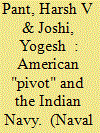

|
|
|
|
|
| Summary/Abstract |
Just after addressing the Shangri-La Dialogue in Singapore in June 2012, Leon Panetta, then the American secretary of defense, visited New Delhi, where he remarked that “defense cooperation with India is a lynchpin in this [pivot] strategy.” Since the thrust of the “pivot” has been on the maritime balance of power in the Indo-Pacific, both the Pacific and the Indian
Oceans have gained tremendous traction in the new U.S. strategy
|
|
|
|
|
|
|
|
|
|
|
|
|
|
|
|
| 2 |
ID:
185664
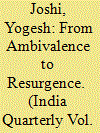

|
|
|
|
|
| Summary/Abstract |
This article aims to understand India’s remarkable nuclear journey in the last 75 years. It categorises India’s atomic trajectory into four distinct periods: Ambivalent (1948–1988), Reserved (1989–1998), Responsible (1998–2008) and Resurgent (2009 onwards). In doing so, the article provides an account of how the changing nature of India’s nuclear programme has impacted the scope and depth of its nuclear deterrence. However, the programme’s status is also consequential for India’s foreign policy practice and its approach to using force in international politics. The article shows how India’s nuclear capability, its foreign policy practice, and its approach to the use of force have seen dramatic shifts in the last thirty years. A resurgent India aims to become a world-class nuclear power, undisturbed by foreign perceptions of its atomic programme and increasingly resolute to use force even under the threat of escalation by its nuclear adversaries.
|
|
|
|
|
|
|
|
|
|
|
|
|
|
|
|
| 3 |
ID:
164695
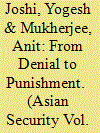

|
|
|
|
|
| Summary/Abstract |
This article argues that China’s rise and its growing military power have intensified the Sino-Indian security dilemma. For a long time after the 1962 war, India’s military posture along the India–China border was mostly defensive in nature and could be characterized as imposing “deterrence by denial.” However, over the last decade, China’s growth trajectory coupled with rapid modernization of its military called into question the efficacy of this approach. India now feels much more vulnerable to China’s increasing military power both on the land frontier as well as in the maritime domain. The increasing intensity of this security dilemma has informed a consequent shift in India’s military strategy vis-à-vis China to one of “deterrence by punishment.” Theoretically, this article examines how changes in the severity of a security dilemma can lead to changes in military strategy. While doing so it explains India’s current military strategy to deal with the challenge posed by China.
|
|
|
|
|
|
|
|
|
|
|
|
|
|
|
|
| 4 |
ID:
189563
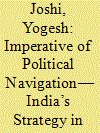

|
|
|
|
|
| Summary/Abstract |
The dissonance between the positions of India’s Nehruvian strategic community and of the Indian strategic establishment, especially regarding the freedom-of-navigation operations the U.S. Navy long has conducted in India’s exclusive economic zone, is rooted in realpolitik considerations, especially China’s rise as a great power, and the difference between international law and politics.
|
|
|
|
|
|
|
|
|
|
|
|
|
|
|
|
| 5 |
ID:
190369
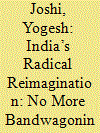

|
|
|
|
|
| Summary/Abstract |
In 2020, following the deadliest border crisis with China in over 45 years on the Himalayan frontier in the Galwan valley, India’s External Affairs Minister S. Jaishankar clarified that “we were never part of an alliance and will not be.”Footnote1 Aversion to alliances notwithstanding, there is more than one way to balance China’s rise, and India has recently decided that it needs to. Indian media often attributes Beijing’s increasing aggressiveness to the shifts in Sino-Indian balance of power: “the balance of power has shifted against us and so, China’s behaviour has changed too.”Footnote2 New Delhi’s approach to restoring the balance is to build a strategic partnership with the United States, and to reinforce the global balance of power in favor of the US. As former Indian Foreign Secretary and former Ambassador to China Vijay Gokhale opined in The New York Times in 2020, “The world needs balance—at the moment, no country other than the United States has the means to ensure it. At a practical level, its leadership is indispensable.”Footnote
|
|
|
|
|
|
|
|
|
|
|
|
|
|
|
|
| 6 |
ID:
151969
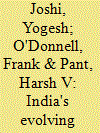

|
|
|
|
|
| Publication |
New Delhi, Alpha Editions, 2017.
|
| Description |
xvi, 82p.pbk
|
| Standard Number |
9789386367754
|
|
|
|
|
|
|
|
|
|
|
|
Copies: C:1/I:0,R:0,Q:0
Circulation
| Accession# | Call# | Current Location | Status | Policy | Location |
| 058984 | 358.17054/JOS 058984 | Main | On Shelf | General | |
|
|
|
|
| 7 |
ID:
183364
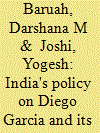

|
|
|
|
|
| Summary/Abstract |
The ongoing contention between Mauritius and the UK over the sovereignty of the Diego Garcia presents a difficult challenge for Indian foreign policy-makers. New Delhi's principled opposition to colonialism and its historical relationship with Port Louis has made it steadfastly support the Mauritian claim. However, such principled foreign policy militates against India's quest to balance the growing Chinese influence in the Indian Ocean. Insofar, Diego Garcia allows the US Navy to maintain an active presence in the Indian Ocean, thereby keeping the Chinese naval power at bay. Balance of power considerations notwithstanding, the expanding trajectory of the Indo-US strategic partnership also demands New Delhi to weigh the burden of its policies on Diego Garcia carefully. This article juxtaposes India's historical record on Diego Garcia during the Cold War with its contemporary approach to the issue. In doing so, it sheds further light on India's strategic decision-making in the Indian Ocean, its dilemmas in confronting a genuinely hostile maritime power in the region, and deliberates on potential options for dispute resolution which can not only satisfy Mauritian demands but also ensure a healthy balance of power in the Indian Ocean.
|
|
|
|
|
|
|
|
|
|
|
|
|
|
|
|
| 8 |
ID:
132474
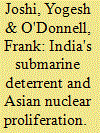

|
|
|
|
|
| Publication |
2014.
|
| Summary/Abstract |
New Delhi's plans for nuclear-armed submarines could undermine efforts to restrict fissile materials, and set off a naval arms race.
India has become a more or less accepted member of the global nuclear order, but the state's emerging undersea deterrent continues to be a source of concern. Its efforts to create nuclear-armed submarines began in the 1980s, and technical progress was slow during the project's first three decades. India has recently made some bold strides, however, and in 2009 unveiled its first nuclear submarine, INS Arihant. The boat is now undergoing sea trials, and is scheduled to be introduced into the Indian Navy by early 2015. Several similar vessels are under construction: New Delhi plans to field a fleet of between four and six nuclear-armed submarines by the end of the decade.
|
|
|
|
|
|
|
|
|
|
|
|
|
|
|
|
| 9 |
ID:
141500
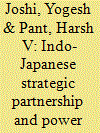

|
|
|
|
|
| Summary/Abstract |
As the U.S.-led security order in Asia gradually comes under stress, regional powers such as India and Japan are formulating a strategic partnership to hedge against the vulnerabilities accruing out of the unfolding power transition in Asia. China’s unprecedented economic and military rise coupled with America’s perceived relative decline is drawing New Delhi and Tokyo into a strategic embrace. To insure their interests in this era of great power transition, New Delhi and Tokyo are keen to hedge against America’s possible failure in containing China’s growing assertiveness in Asia. This hedging strategy is evident in their growing strategic partnership which consists of a triple hedge: increasing bilateral defense partnership against fears of American retrenchment; economic engagement against an over-dependence on China; and a multilateral hedge against China’s growing influence in international and regional institutions. However, for Asia’s two prominent middle powers, transforming these nascent attempts into an effective strategic response to Asia’s current power transition would also require cooperation in the nuclear domain, an area where their policies continue to diverge.
|
|
|
|
|
|
|
|
|
|
|
|
|
|
|
|
| 10 |
ID:
153837
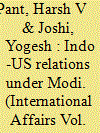

|
|
|
|
|
| Summary/Abstract |
This article examines the transformation in Indo-US relations in the first two years of the Modi government. It first discusses the state of Indo-US relations before Modi's ascent to the premiership in May 2014. The challenges confronting the relationship were not strictly bilateral; Modi's image and its historical baggage had also made them personal. Subsequently, the article elaborates on the significant progress made in the bilateral relationship during the first two years of the Modi government. The concluding section explains the rationale behind Modi's outreach to the United States. Three factors appear to have had a significant influence: a conviction that India's developmental priorities cannot be met without substantive cooperation with the US; the strong political authority Modi enjoys within his own party and in the Indian parliament; and the structural changes in India's security environment brought about by an aggressive China and its growing strategic convergence with Pakistan, leading to a re-think on ‘non-alignment’ as a guiding principle of foreign policy.
|
|
|
|
|
|
|
|
|
|
|
|
|
|
|
|
| 11 |
ID:
135842
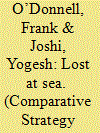

|
|
|
|
|
| Summary/Abstract |
India's first nuclear-armed ballistic missile submarine, the INS Arihant, signifies a milestone in its rise to power. However, its development and supportive strategic discourse reveal the absence of an Indian grand strategy. India urgently needs a grand strategy to direct its defense policy.
|
|
|
|
|
|
|
|
|
|
|
|
|
|
|
|
| 12 |
ID:
185800
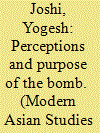

|
|
|
|
|
| Summary/Abstract |
Much of the literature on India's nuclear programme assumes that China's nuclear capability drove New Delhi, the strategically weaker actor, to pursue a nuclear weapons capability. China's nuclear tests not only rendered New Delhi militarily insecure and dented its claim for the leadership of the Third World but they also polarized the domestic debate over the utility of the bomb. In the global scheme of nuclear proliferation, therefore, India was just another fallen nuclear domino. Marshalling recently declassified documents, this article revisits India's nuclear behaviour during the crucial decade between 1964 and 1974. By focusing on threat assessments made at the highest levels and internal deliberations of the Indian Government, this article shows how, contrary to the claims made in the literature, Indian decision-makers did not make much of the Chinese nuclear threat. This conviction emanated out of their distinct reading of the purpose of nuclear weapons in China's foreign and military policy; their perceptions of how India could achieve nuclear deterrence against China by using the bipolar international politics of the Cold War; and, finally, their understanding of the political costs of developing an indigenous nuclear response to China's nuclear threat. New Delhi's nuclear restraint resulted from its perceptions of Chinese nuclear intentions and its beliefs about the purpose of the bomb in Sino-Indian relations. India's perceptions of China as a nuclear adversary and its decision-makers’ views on the purpose of nuclear weapons in this rivalry were fundamentally different from the expectations set out by the domino theory of nuclear proliferation.
|
|
|
|
|
|
|
|
|
|
|
|
|
|
|
|
| 13 |
ID:
121085
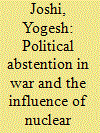

|
|
|
|
|
| Publication |
2013.
|
| Summary/Abstract |
Clemenceau's famous statement-'War is too important to be left to the generals'-represents an essential conflict in civil-military relations during crisis situations, especially with regard to the demarcation of boundaries for civil and military authority in the conduct of war. Where and when, in the conduct of war, should the political class step down and military commanders take over? Or, since, as the Clausewitzian dictum of war being a continuation of politics suggests, can war ever be considered a purely military enterprise? With the advent of nuclear weapons, these questions have become immensely important since military exigencies can now have extreme political ramifications.
|
|
|
|
|
|
|
|
|
|
|
|
|
|
|
|
| 14 |
ID:
163317
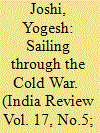

|
|
|
|
|
| Summary/Abstract |
It took approximately two decades for the Indian Navy to acquire submarines even when the first naval plan prepared by the Naval Headquarters in New Delhi and informally submitted to the British Admiralty in September 1947 contained an active submarine component. Other littoral navies in the Indian Ocean went for submarines much earlier. Using Indian, British, and U.S. archives, this article argues that the delay in India’s submarine arm was largely a result of the vagaries of the Cold War. Both Britain and the United States wanted the Indian Navy to contribute to the Western effort for a collective defense against the communist threat, which was largely conceived to be submarine based. This resulted in a surface heavy force structure. However, as India’s threat perceptions changed in 1960s, its quest for submarines gained momentum. When negotiations with the Western powers did not result in anything concrete, Indian Navy turned to the Soviets for initiating its own submarine arm. This decision had long-term implications for the Indian Navy as its underwater fleet thereafter remain dependent upon Soviet assistance for the rest of the Cold War.
|
|
|
|
|
|
|
|
|
|
|
|
|
|
|
|
| 15 |
ID:
171175
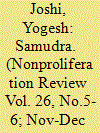

|
|
|
|
|
| Summary/Abstract |
India is advancing slowly toward operationalizing its nuclear triad. Its first nuclear-propelled ballistic-missile submarine (SSBN), the INS Arihant, conducted its maiden deterrent patrol in November 2018. However, doubts exist around the capability of India’s SSBN, the effectiveness of its command and control, and its effects on regional stability in South Asia. This article examines the history and future trajectory of India’s sea-based nuclear forces and describes how India seeks to maintain robust command and control over its undersea nuclear weapons.
|
|
|
|
|
|
|
|
|
|
|
|
|
|
|
|
| 16 |
ID:
164575
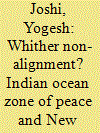

|
|
|
|
|
| Summary/Abstract |
First proposed in 1964 by the Sri Lankan prime minister, the Indian Ocean Zone of Peace [IOZP] entailed eradication of foreign military bases from the Indian Ocean region as well its denuclearisation. During the Cold War, India was one of the most vehement supporters of IOZP. If some saw India’s interests in the IOZP as another manifestation of Nehruvian idealism, others viewed it as a part of its non-aligned foreign policy. This analysis argues otherwise. India’s record on IOZP reveals a policy of selective alignment with Great Powers and its adaptation to the principles of power politics in international relations. India’s support for the presence of one or the other Great Powers in the Indian Ocean region found premise on balancing those it considered hostile to its national security interests. In public, India supported the call for IOZP as dictated by its non-aligned foreign policy; privately, New Delhi remained highly sceptical and often worked to IZOP’s detriment. Under the cloak of IOZP, India not only pursued diplomatic alignment with Great Powers but also ensured that its own regional ambitions remain unchecked. In this picture, India’s role was not only supportive of the Cold War but to the extent it could use the opportunities provided by superpower rivalry in the region to further its own ends, even determinative of the process.
|
|
|
|
|
|
|
|
|
|
|
|
|
|
|
|
| 17 |
ID:
192021


|
|
|
|
|
| Summary/Abstract |
Janina Dill, Scott Sagan and Benjamin Valentino have demonstrated how calculations over the morality of contending norms may influence public's readiness to use nuclear weapons. I argue that such atomic dispositions are highly contingent on the nature of the adversary. Public may react differently to various nuclear targets because adversaries evoke different levels of retributiveness. When deciding between the lives of fellow citizens and those of foreign noncombatants, a bargain is easier to reach against targets which evoke feelings of hatred and anger due to historical, cultural or domestic political reasons. Using the Indian case, I demonstrate why the variance in the character of the threat is a substantive issue. Specifically, I show why the India-China dyad exhibits a greater degree of normative prohibition compared to the India-Pakistan dyad.
|
|
|
|
|
|
|
|
|
|
|
|
|
|
|
|
|
|
|
|
|